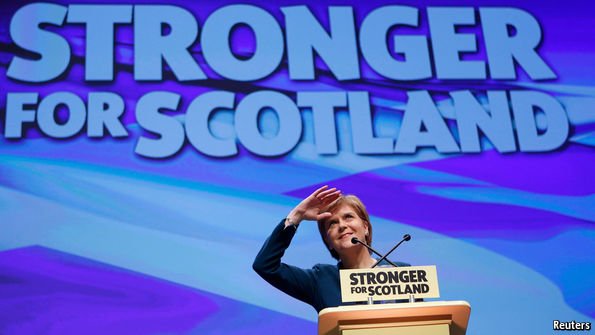DELEGATES and journalists arriving in Glasgow today for the Scottish National Party (SNP) conference had one big subject on their minds: the political puzzle that has been hanging over Nicola Sturgeon since June 23rd. In Britain’s referendum on leaving the EU, every single area of Scotland voted to remain in the union. The country is thus being dragged out of the club by England. What was the first minister—herself a prominent face of the Remain campaign—going to do about that?
For keen pro-independence campaigners, some of whom have been clamouring for a new vote on quitting the United Kingdom since they lost the one in 2014, this is the SNP’s golden chance. Time to crack on with a new vote: time to untether Scotland from a right-wing, inward-looking England heading fast for a hard Brexit. It is not hard to sympathise with that argument. An ugly isolationism is taking hold in England and seems likely to impoverish Britain as a whole.
The problem is that while Brexit may strengthen the political arguments for Scoxit, it weakens the (already flimsy) economic ones. Just as a hard border will now go down across the Channel (and possibly between Northern Ireland and the Republic), so it would between an independent Scotland still in the EU and the rest of the United Kingdom. And Scotland does far more trade with the rest of the UK than it does with the rest of the EU. Polls have reflected that: by some measure fewer Scots want independence now than did before June 23rd.
Mrs Sturgeon, then, must respond to the enthusiastic calls for a new referendum, especially in her own party, while buying time. She is pro-independence, but also temperamentally cautious—more so than her predecessor Alex Salmond, now a signed-up supporter of a prompt second referendum—and reads the polls. But recent weeks have brought growing tensions between fellow gradualists and secessionist radicals in the SNP: this morning Angus Robertson, her ally, was announced as the winner of the party’s deputy leadership contest. That was expected, but the strong showing (in a highly loyal, centralised party) for Tommy Sheppard, an outspoken Edinburgh MP and one of the flag bearers for the radical tendency, was striking. So as she strode onto the stage in Glasgow this morning, Mrs Sturgeon needed to establish a holding position.
She did so—with a characteristic canniness. To tremendous applause in the hall she announced: “I am determined that Scotland will have the ability to reconsider the question of independence and to do so before the UK leaves the EU…So I can confirm today that the Independence Referendum Bill will be published for consultation next week.” This is not another formal bid for independence. Mrs Sturgeon said nothing about securing approval in Westminster for such a referendum, or even putting the bill before legislators in Holyrood. But it does provide a sense of momentum and unifies the party, still extremely popular in Scotland, ahead of local elections next year.
That has ramifications for Brexit as a whole. It strengthens Mrs Sturgeon’s hand vis-a-vis London. The first minister has grumbled about Scotland being shut out by Theresa May’s already markedly controlling and centralising operation in Downing Street. She has insisted that Scotland remain inside the single market and threatened to put legislative and legal road blocks in the way of a Brexit deal. By dangling over Britain’s firmly unionist prime minister the prospect of a new independence referendum north of the border, she makes herself a bigger player in both London—and Brussels, where plenty (including Guy Verhofstadt, the European Parliament’s point man for Brexit) sympathise with her.
And this leverage can also be applied to Scotland’s place within the United Kingdom. Ramping up the case for independence—the argument that Scots have too little say over how they are governed—also ramps up the case for further devolution. Only last month Alex Neil, a former SNP minister, urged her to grab powers coming back from Brussels—over things like employment rights, farming and transport policy—for Holyrood and thus achieve what he calls “neo independence”. Leaving the EU will also exempt Britain from certain rules on tax harmonisation, he points out, potentially giving Scotland more freedom to set its own rates (of VAT, for example).
Indeed, this may be Mrs Sturgeon’s central goal. Read between the lines of her speech this morning and you see an argument for a post-Brexit Britain to go much farther down the road to internal federalism. “If you think for one second I’m not serious about doing what it takes to protect Scotland’s interests, then think again”, she warned. This is, in other words, probably a clever bluff that responds to strong feelings within the SNP. Quite how successfully it will do so will become clear over the rest of the conference (early reactions have been extremely enthusiastic).
Funnily enough, it also illustrates similarities between the SNP and the two main UK-wide parties. Both the Labour and Conservative conferences saw activists and their sensibilities extensively indulged: Jeremy Corbyn reeling out favourite left-wing tunes in Liverpool and Theresa May delighting her party by committing to a hard Brexit, and a crackdown on immigration, in Birmingham last week. The same activist-driven politics is on show in Glasgow now. North and south of Hadrian’s Wall, this seems to be the age of the coddled, unconfronted party member.








